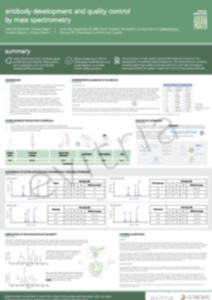Big and small companies alike find value in outsourcing to a contract research organization (CRO) to produce custom antibodies, like recombinant antibodies from evitria.
What makes a good CRO and which CRO is right for your specific antibody needs? A CRO takes on research, development or production assignments, thus saving the sponsor time, cost and capacities. This article will give valuable pointers to the essential factors any company must consider when screening for CROs for antibody production services.
evitria is a contract research organization (CRO) for custom therapeutic research recombinant antibodies and a contract development and manufacturing organization (CDMO) for diagnostic and assay developers. Our single focus is on recombinant antibody expression. We therefore refer to the specific case of recombinant antibody production in this article.
The selection process is of utmost importance before outsourcing to a recombinant antibody production CRO. Choosing the right CRO is difficile, and the biggest, most well-known companies are likely not the best match for a certain research and development project.
Subscribe to our Newsletter
Get all the latest updates, and learn about our advancements in antibody production.
Subscribe now
These are the 5 key factors that must be taken into consideration when choosing a contract partner for antibody production:
Consistent quality is an issue with many mediocre CROs for recombinant antibody expression. Recombinant antibody production is a complex process that involves many demanding steps in project planning and in the manufacturing plant.
Therefore, quality is not just the final analysis certificate of the antibody. High quality is the result of having quality control and quality assurance measures in place at key milestones along the project timeline.
Speed in pharma and biotechnology is of great importance. Hence, a contract research organization for recombinant antibody production strives to deliver within few months. Only the very best recombinant antibody providers manage to combine quality and speed. Those companies leverage the synergies of efficient teams, sufficient capacities and profound experience in their field.

Recombinant antibody production for research and development applications requires reliability and reproducibility. This is only possible for companies with a vast wealth of experience, having many thousands of expressions of diverse antibodies under their belt.
Reliable companies will be glad to share other client’s experiences with you to show their credentials.
Costs are an important factor when considering a CRO for an antibody manufacturing collaboration contract. But, of course, cost is not everything. A more expensive recombinant antibody expression service provider delivering high quality work with high speed is worth the money.
Having to deal with missed project milestones and repeat work usually proves more expensive than a reliable CRO.
To ensure fruitful collaborations, sponsor and CRO companies must have compatible company cultures. The CRO must have a stable company structure and financial stability.
This environment fosters transparency, efficient communication between people, enabling a profitable relationship. Ideally, the CRO is not a mere service provider, but an extended part of the sponsor’s team, consisting of individual humans.
Read more: Overview of CDMOs in monoclonal & recombinant antibody production | The role of CROs in monoclonal antibody production
What are the benefits of outsourcing recombinant antibody production efforts to an established antibody service provider?
Setting up the necessary facilities in-house demands major investments in infrastructure and skilled personnel. The alternative – outsource to CROs – reduces expenses and protects against the risks of failure, thus increasing potential profits of the project.
Contract research organizations are used to navigating in the field of ever-increasing complexity of biotechnological products. Their focus, experience and knowledge enables them to work innovatively.
Due to their specialization, CROs have expertise, infrastructure and capacities already at place. They can work with very short lead times and nonetheless deliver high quality products, thus reducing the time to market.
Read more: Antibody production companies | CDMO antibody production – what are the services offered?
The production of high quality, reproducible material is critical for the development of antibody-based therapeutics. The evitria-Genovis workflow combines rapid, high quality, antibody production with high-throughput mass spectrometry for greater insight and control of key quality attributes.
Download the poster to learn more.

To summarize, when choosing a CRO for recombinant antibody expression, the factors quality, speed, experience and knowledge, cost and culture must be considered.
evitria AG is a contract research organization (CRO) for antibody production. We provide services to our customers who outsource their antibody production needs. As a CRO, evitria offers specialized expertise in CHO-based transient expression of antibodies and other proteins, including the production of bispecific and fusion antibodies, as well as the afucosylation and Fc-silencing of antibodies. By partnering with evitria, clients can benefit from our extensive experience and capacity, as well as our ability to provide high-quality antibody production in a cost-effective and timely manner.